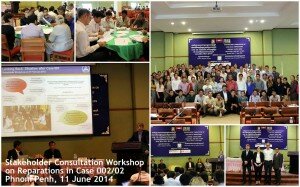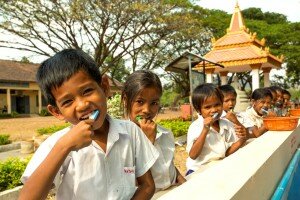Stakeholders Consultation on Reparations for Victims of Khmer Rouge
A successful Stakeholders Consultation on Case 002/02 Reparations: Lessons Learned, Best Practices & Next Steps, presided over by H.E. Tony KRANH, Acting Director of the Administration Office of the Extraordinary Chamber in the Courts of Cambodia (ECCC), was conducted on 11 June 2014 in Phnom Penh.
In preparation for the next trial, Case 002/02 which is about to start End of July 2014, the Victims Support Section and the Lead Co-Lawyers Section of the ECCC consulted with civil party lawyers and representatives of civil society organizations, victims associations, state authorities, and donors to identify and discuss potential reparation requests for the benefit of victims of the Khmer Rouge regime. A wide variety of criminal charges will be included in this next trial, including the genocide of ethnic minorities, forced marriages and rape, and internal purges. Accordingly, the Victims Support Section and Lead Co-Lawyers Section are seeking to develop a diverse range of reparation projects that will address the specific harms suffered as a consequence of the crimes charged, and bring redress to civil parties.
Voices of Participants:
“I am very satisfied with the Stakeholders Consultation, which provided an opportunity to discuss projects that will benefit civil parties of Case 002/02. I wish to make an appeal to national and international donors to please make a donation to our requested reparation projects.”
Mr. CHUM Mey
Civil Party in Case 002 and President of Ksem Ksan Victims Association
++
“I think that this was an excellent opportunity for stakeholders to sit together and discuss the issue of reparations in Case 002/02 for the interest of the civil parties. It was a meaningful and dynamic consultation between the participants and organizers, who collaborated to formulate reparation projects and to request financial support from potential donors.”
Mr. Peou Dara VANTHAN
Deputy Director, Documentation Center of Cambodia
+++++++
GIZ supports Royal Government of Cambodia to Kick-off Efforts to Improve Public Service Efficiency
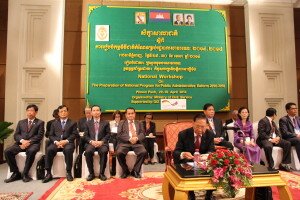
H.E. Keat Chhun, Deputy Prime Minister and guests attend the opening session of the National Workshop for Administrative Reform 2014 – 2018.
25 June 2015
Phnom Penh, Cambodia – Parents seeking a quality public education for their children; citizens requiring an ID card or a marriage certificate; a small entrepreneur wanting to register her business; the victim of petty crime awaiting a police investigation – these people all have one thing in common: in times of need, they are expecting efficient and effective public services from their government. Yet as everybody in Cambodia knows, this is not always the case. With the aim to provide more effective and efficient public services, the government of Cambodia has pledged to reform its public administration.
To support this process, the newly established Ministry of Civil Service is working to establish a new 5-year National Programme for Administrative Reform 2014-2018.
The Ministry of Civil Service, with the support of German Development Cooperation provided through the “Decentralisation and Administrative Reform Programme” that implemented by GIZ, organised a National Workshop on 29-30 April 2014 to review progress made on public administrative reform. The purpose of the workshop was to consult with more than 300 representatives from ministries and institutions at national and sub-national level on the next stage of the reform.
The Ministry of Civil Service commenced by outlining the three core strategies of the administrative reform: 1) strengthening the quality and delivery of public services; 2) strengthening the management and development of human resources within the Civil Service; and 3) further reforming the compensation regime of civil servants.
Representatives from the Ministry of Health and Ministry of Education, Youth and Sports presented their achievements in improving public service delivery in order to provide participants with insights into effective approaches and practices.
The World Bank and the German Embassy, as development partner representatives, took the opportunity to voice their support for ongoing administrative reform and encouraged the ministry to take a demand-driven approach to implementation in order to engender ownership and ensure that the reforms address ministry priorities and are harmonised with sectoral reforms.
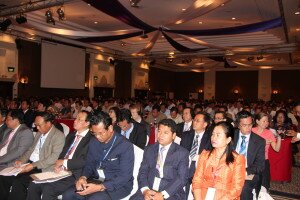
Participants and guests at the National Workshop for Public Administrative Reform 2014-2018, on 29-30 April 2014 held at Intercontinental Hotel.
Participants were then invited to participate in discussion groups on the topics of public service delivery; human resource management; human resource development and remuneration. Facilitated discussions encouraged participants to share current practices and trends; to identify issues and constraints; and to identify priorities for the next phase of administrative reform.
These discussions demonstrated awareness of a growing demand for reform among civil servants that is driven by following points:
- Cambodian citizens are better educated and more informed; they expect improved public services and a more responsive government; and they are less willing to accept the need to make informal payments;
- Cambodia’s objective of becoming a middle-income country by 2030, and a well-integrated member of ASEAN, as well as an internationally accepted player in the global economy;
- Civil servants want to be well-respected members of a society and be appreciated for their contribution to the well-being of their nation; and
- The civil service needs to compete with a burgeoning private sector to attract and retain qualified and well-motivated staff.
In his closing speech, His Excellency Pich Bunthin, the new Minister of Civil Service, stressed that the workshop “created an important public forum to review experience and to identify in-depth actions for public administration reform”. It presented a clear message to all ministries and institutions that they hold ownership and are accountable for effective reform in their sectors, and are therefore responsible for adopting a proactive approach in implementing the National Programme for Administration Reform.
The National Workshop will be followed by a series of targeted workshops to focus on aspects of the reform programme in order to develop a broad base consensus on how best approach its implementation. It is envisaged that the national programme will be finalised in coming months, will focus on early successes to build momentum and commitment while at the same time gradually introducing more fundamental longer term reforms.
GIZ Regional Fit for School Programme Ready for Expansion
4 June 2014
Kompong Chhnang, Kompot, Kompong Thom, Phnom Penh and Takeo Provinces, Cambodia – Diseases related to lack of hygiene, such as diarrhea and respiratory infections, are still the leading cause of death for children living in Cambodia. By the time children enter school, more than half are diagnosed with intestinal worms and vast majorities have dental caries, virtually all untreated. Compared to healthy pupils, students suffering from pain and disease are frequently absent from school, sleep less, and demonstrate an overall lower academic performance: Health status and school performance are closely related.
GIZ’s Regional Fit for School Programme in Cambodia aims to prevent infectious diseases among public primary school students with the aim to improve school attendance through three simple and low-cost interventions: 1) daily hand washing with soap; 2) daily tooth brushing with fluoride toothpaste; and 3) bi-annual deworming.
8,000 students in Cambodia benefit from hygiene programme, 100,000 to follow
The programme has been supporting the School Health Department of the Ministry of Education Youth and Sport (MoEYS) of Cambodia implement its schemes since December 2011. Since programme inception in Cambodia, nearly 8,000 students have benefitted from improved hygiene in ten public primary schools in Phnom Penh and other four provinces: Kompot; Takeo; Kompong Thom; and Kompong Chhnang. This regional programme is also being implemented in three other countries: Lao PDR, Indonesia and the Philippines. The programme aims to further support the MoEYS to scale up the program in collaboration with other partners to benefit 103,000 more primary students in Cambodia by 2015.
Regional programme partners include SEAMEO INNOTECH, a regional center of the South-East Asian Ministers of Education Organization.
Partners collaborate to improve programme expansion support
After two years of programme implementation, the Regional Fit for School Programme in Cambodia is now supporting the Ministry of Education, Youth and Sport prepare for programme expansion in collaboration with partner organisations active in water, sanitation and hygiene projects (WASH) in schools, namely UNICEF Cambodia, ESC-BORDA and World Vision Cambodia. The programme expansion is led by the School Health Department of the MoEYS, and is supported financially by partner organisations that include daily group hand washing in schools in their respective WASH programmes. GIZ provides technical assistance on integrating daily hygiene activities in these programmes and instruction on how to support schools to construct necessary group washing facilities.
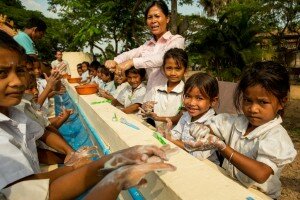
The geographical areas covered by the expansion include: additional schools in the five existing Regional Fit for School provinces, plus schools in Siem Reap and Preah Vihear provinces. To prepare for the expansion, the Regional Fit for School Programme team has been working very closely with the School Health Department and partners, and has been preparing and finalising programme tools necessary for building the capacity of educational officers at sub-national level. This capacity development will prepare the officers for the implementation of daily hygiene practice at the schools. The tools, which can also be used by the schools and communities to reinforce their participation in the programme, include the Fit for School School-Community Manual and video, and a group washing facilities catalogue. All materials were developed jointly with the MoEYS.
Parallel to this expansion, the Regional Fit for School Programme is introducing a new group hand washing facility design, which includes low-cost and easy-to-install features, while saving water. The design is able to accommodate 22 children at a time, has been tested successfully, and installed in approximately 100 locations in the Philippines. Currently, a prototype of the facility is being produced in Cambodia and following a successful test run, the program will work with partners to introduce the design and installation in the expansion schools. For more information on the design facility visit the Facebook group on Hardware for Group Hand Washing in Schools: https://www.facebook.com/groups/632408213516487/
With promising prospect, the Regional Fit for School Programme is committed to continuing collaboration with key stakeholders to ensure that the expansion is a success. Along the way, the programme will fulfill GIZ’s commitment to the health and well-being of Cambodian children and national development.
For more information on GIZ’s Regional Fit for School Programme, please contact:
Ayphalla Te
Country Project Manager
Email: Mobile phone: +855 12 906 908
US Ambassador David Lane Meets Stone Conservation Unit in December 2013
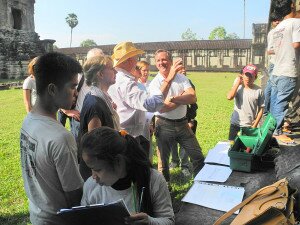
H.E. David Lane, US Ambassador to the United Nations Agencies in Rome meets trainees of the stone conservation unit at Angkor Wat temple
08 December 2013
SIEM REAP, Cambodia – H.E. David Lane, US Ambassador to the United Nations Agencies in Rome toured Angkor Park in December 2013. At Angkor Wat, he met the trainees of the Stone Conservation Unit (SCU) who were taking part in a workshop withICCROM (International Centre for the Study of the Preservation and Restoration of Cultural Property) consultant and conservation expert Simon Warrack.
During the workshop, students studied chisel marks on an unfinished wall to determine what tools the ancient stone carvers used.
“In his way they can understand how their ancestors carved the temple,” Simon Warrack explained. “Later, they will actually carve some sandstone using these traditional techniques.” By understanding how the temples were built, the students improve their ability to preserve them into the future.
The US Mission to the United Nations supports the conservation of cultural heritage, such as preservation projects at Angkor Wat and Phnom Bakeng.
Legal Protection Guidelines to Stop Violence Against Women, Developed by the Ministry of Women’s Affairs with Support from GIZ
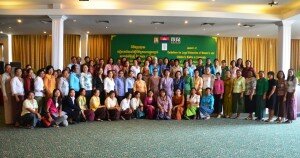
Cambodian Minister of Women’s Affairs Dr. Ing Kantha Phavi, German First Secretary Birgit Strube and manager of the GIZ Access to Justice for Women’s project Dr. Dagmar Baer along with Judicial Police Agents and officials of the Ministry of Women’s Affairs.
12 June 2014
Phnom Penh, Cambodia, The Ministry of Women’s Affairs of Cambodia, the Embassy of the Federal Republic of Germany and GIZ Cambodia have launched here today the Guidelines for Legal Protection of Women’s and Children’s Rights, which aim to improve response for cases of intimate partner violence and sexual violence against women, as well as domestic violence and sexual violence against children.
“According to a recent survey undertaken by four UN agencies in Cambodia, 25 percent of women have experienced sexual or physical violence (or both) at least once from an intimate partner,” noted Minister of Women’s Affairs Dr. Ing Kantha Phavi during launch event. “These guidelines will contribute to strengthen the law enforcement in order to facilitate access of women and children to the judicial system and to make perpetrators accountable for their acts. The guidelines are to be used by the Judicial Police Agents of the Ministry of Women’s Affairs as well as by any state and non-state service provider assisting women survivors of gender-based violence.”
Ms. Birgit Strube, First Secretary of the German Embassy in Cambodia, said “Germany has situated gender equality and women’s empowerment at the center of our bilateral and
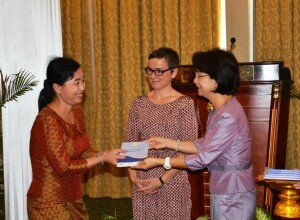
Cambodian Minister of Women’s Affairs Dr. Ing Kantha Phavi and German First Secretary Birgit Strube deliver guidelines to one of the 137 Judicial Police Agent of the Ministry of Women’s Affairs.
sectoral policy dialogue with the Royal Government of Cambodia. Between 2011 and 2013, more than 2,500 women and girls survivors of intimate partner violence, sexual violence and trafficking, as well as more than 800 children of them, received basic services through a Fund led by the Ministry of Women’s Affairs and implemented by six NGOs.”
The Guidelines for Legal Protection of Women’s and Children’s Rights in Cambodia have been developed under the framework of the Access to Justice for Women project, jointly implemented by the Ministry of Women’s Affairs and GIZ with funds from the German Federal Ministry for Economic Cooperation and Development (BMZ) and –between 2010 and 2013- with co-funding from the Spanish Agency for International Development and Cooperation (AECID).
Other achievements of the Access to Justice for Women project in the last three years included police and legal training for the 137 Judicial Police Agents of the Ministry of Women’s Affairs as well as the integration of good practices for behavioural change to promote gender equality amongst young people in school curricula for 127 lower-secondary schools.
For the Guideline in Khmer, please click here
For the Guideline in English, please click here
Further information: Dr. Dagmar Maria Baer, Program Manager, Access to Justice for Women project, GIZ [Tel: + 855 23722298; ]
